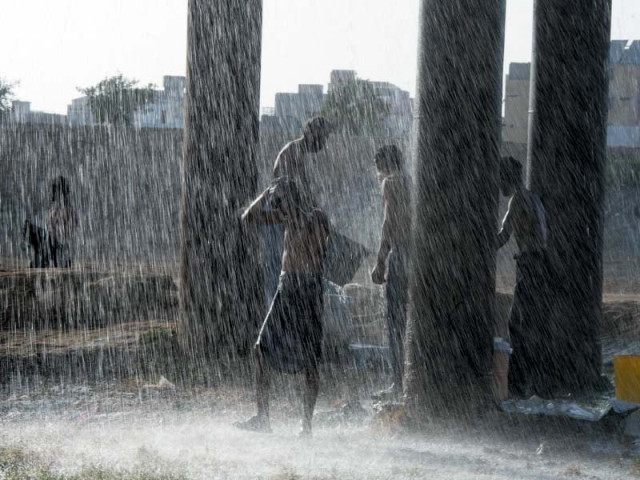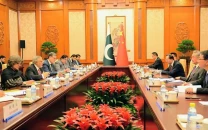Less than 8% of urban waste water is treated in Pakistan, says report
Irrigation official says usage of sewerage water for irrigation goes unnoticed in the country

Residents take a shower under a leaking water pipeline in Karachi. PHOTO: AFP
The paper also says that, the rest of the contaminated water is being disposed of into the River Ravi and Kabul, irrigation canals, vegetable farms and drains.
On the other hand the study also revealed that major cities of Pakistan like Rawalpindi, Gujranwala, Sheikhupura, Multan, Sialkot, lack water treatment plants.
Need for building water resilient communities as crisis looms over Pakistan
The paper also says that in big cities like Lahore only 0.01per cent of the sewerage water is being treated, in Faisalabad 25.6 per cent, in Karachi it is 15.9 per cent, in Hyderabad it is 34 per cent, in Peshawar it is 36.2 per cent.
Meanwhile, Chairman Pakistan Council of Research in Water Resources (PCRWR) Dr Muhammad Ashraf, while talking to The Express Tribune in connection to the World Water Day which is observed every year on March 22, said, “Just by recycling untreated water, Pakistan can easily address the ongoing water scarcity in the country.”
Ashraf is of the view that if the country could utilise its recycled untreated water then it can help resolve the ongoing water crisis.
However, the PCRWR Chairman regrettably said, “Unfortunately in Pakistan the practice of water recycling is very rare and conservation is not being done due to a shortage of dams.”
Meanwhile, an official of the irrigation department, who spoke to The Express Tribune on condition of anonymity, said, “The practice of using sewerage water for irrigation and farming purpose is increasing and the government is very much aware of this practice, but so far no action has been taken [to stop this practice].”
World Water Day 2017: IMC needs to better manage water
He also revealed that, “The sewerage water used for irrigation contains heavy metals which are later transferred into the fruits and vegetables produced by this untreated water. These vegetables and fruits are highly dangerous for human consumption as they have an adverse impact on human health,” he added.
The official was of the view that one of the major reasons behind an increase in the number of fatal diseases in Pakistan is the consumption of such fruits and vegetables.
Meanwhile Chief of Pakistan’s Meteorological Department said, “In Pakistan floods are common phenomenon during monsoon and every year the country wastes an ample amount of rainwater into the sea.”
Like the PCRWR chairman, the PMD chief also said, “The best possible solution for water conservation in the country is by constructing new dams.”
Published in The Express Tribune, March 22nd, 2017.



















COMMENTS
Comments are moderated and generally will be posted if they are on-topic and not abusive.
For more information, please see our Comments FAQ